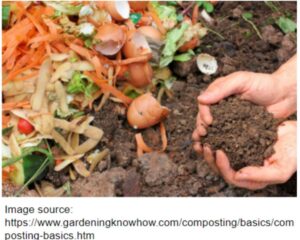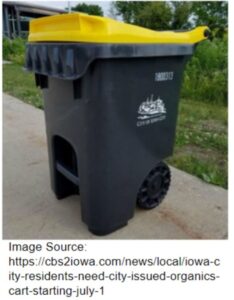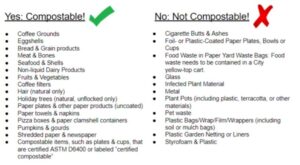![]()
Author: Grace Kollman
Did you know that over 25 percent of what goes into the Iowa City Landfill is food waste? That is about 34,000 tons of food every year in Johnson County alone [1]. Food that ends up in landfills creates the harmful greenhouse gas methane. Methane is over 20 times stronger than carbon dioxide and can lead to local air pollution and climate change [2]. So what can you do about these staggering statistics? The answer is as simple as adding another trash bin to your kitchen.

Composting is the act of separating organic waste such as food scraps, coffee grounds, and eggshells from other waste so that it may be recycled. Composting is an easy way for us to work against climate change by making a small change in our everyday lives. When food is composted micro-organisms break down the biodegradable material into compost that can be used as fertilizer. Beyond serving as a great source of nutrients for plants, using compost as fertilizer has benefits to its environment at large. According to the EPA, compost reduces and in some cases eliminates the need for chemical fertilizers [3]. The use of chemical fertilizer can be incredibly damaging to the environment through water pollution, air pollution, soil acidification, and mineral depletion [4]. By reducing the need for these toxic chemical fertilizers, compost aids reforestation, wetlands respiration, and habitat revitalization efforts by improving contaminated, compacted and marginal soils [5]. Compost also helps water retention in soils which allows us to stretch valuable resources further [6].
I think you get the picture: chemical fertilizers are bad and organic compost is good! Do I have you
convinced yet? If I have your head spinning from all the doom and gloom of the damage food waste disposed of improperly can do to our environment, then rest assured, because the solution is just a few clicks and a cute little trashcan away.
The first step to composting in Johnson County is requesting a yellow-topped compost bin through an online form here. The bin comes in a 25 gallon or 95 gallon size and will be delivered right to your address. Composting services cost $2 a month which will be automatically added to the Johnson County utility bill that is associated with your address. Once you have your compost bin it’s good to be aware of the kinds of things that go in it! Here is a list of all the things that are and are not considered accepted items for the compost bin. In addition to the items listed below, Johnson County also accepts yard waste in the yellow-topped compost bin.


Once you have successfully separated your compostable waste from your non compostable waste, all that’s left to do is bring your new compost bin to the curb with the rest of your waste bins whatever day the trash is picked up in your neighborhood. It really is as simple as that! Once you have incorporated this easy step into your daily routine you are on your way to a more sustainable lifestyle with every food scrap composted. Be sure to stick around the EnvironHawks blog to learn more ways you can make small differences in your life to create a better and more sustainable future!
Sources
- Icgov.org. 2022. Organics (Food and Yard Waste) | City of Iowa City. [online] Available at:
<https://www.icgov.org/foodwaste> [Accessed 10 February 2022]. - Icgov.org. 2022. Organics (Food and Yard Waste)
- US EPA. 2021. Reducing the Impact of Wasted Food by Feeding the Soil and Composting | US EPA.
[online] Available at:
<https://www.epa.gov/sustainable-management-food/reducing-impact-wasted-food-feeding-soil-and-comp
osting#benefits> [Accessed 10 February 2022]. - Hunt, J., 2022. Harmful Effects of Chemical Fertilizers. [online] Hunker. Available at:
<https://www.hunker.com/12401292/harmful-effects-of-chemical-fertilizers> [Accessed 12 February 2022]. - US EPA. 2021. Reducing the Impact of Wasted Food
- US EPA. 2021. Reducing the Impact of Wasted Food